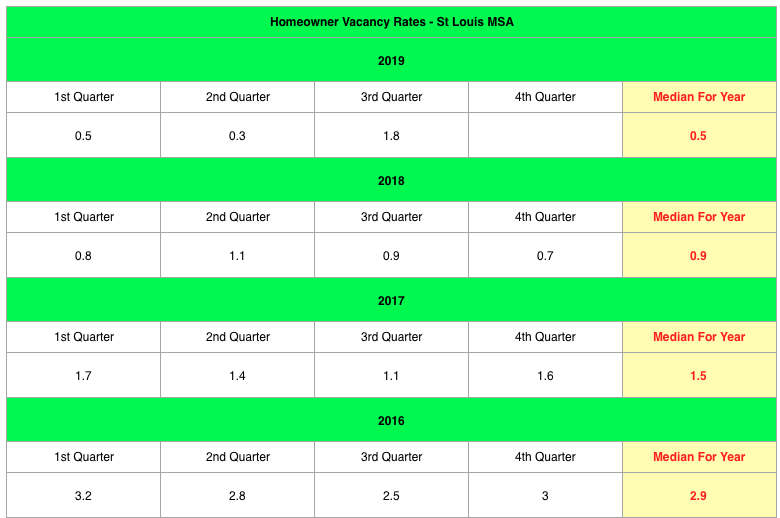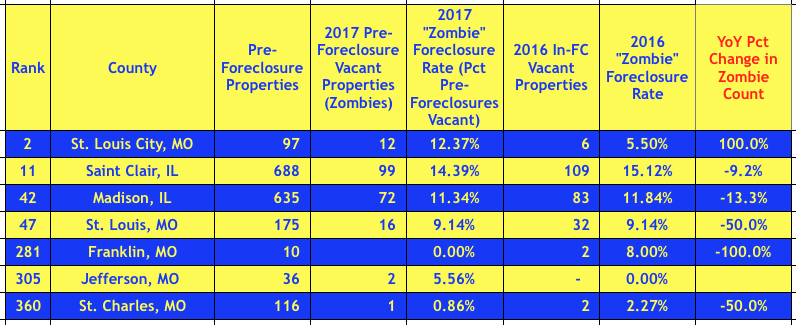By Dennis Norman, on August 28th, 2020 Zombies are on the rise in St Louis! I’m referring, of course, to Zombie foreclosures and not the spooky creatures from scary movies. A zombie foreclosure is a property that is in “pre-foreclosure” meaning it is in the foreclosure process but has not been yet foreclosed upon and is vacant or abandoned by the current owner. We saw the levels of zombie foreclosures rise significantly after the housing bubble burst back in 2008 but then fall around 2012 as the market began its recovery. For the 3rd quarter of 2020, according to ATTOM Data Research, 10.8% of the homes in pre-foreclosure were vacant or otherwise known as “zombies foreclosures”. This is a fairly significant increase in the zombie rate from the prior quarter when 7.79% of the pre-foreclosures were vacant. A year ago, during the 3rd quarter of 2010, the zombie foreclosure rate was 7.77%.
St Louis vacant property rate rises during 3rd quarter as well..
As the table below also illustrates, 2.95% of the more than 1,000,000 residential properties in the St Louis MSA were vacant during the 3rd quarter of 2020 which is an increase from 2.88% for the 2nd quarter of 2020 as well as an increase from a year ago when the vacancy rate was 2.86%.
[xyz-ips snippet=”Foreclosures-For-Sale-and-Homes-For-Sale”]
St Louis Area Vacant Homes and Zombie Foreclosures

By Dennis Norman, on February 27th, 2020 Of the 4,531 residential properties located within the 63113 zip code in the City of St Louis, over 18 percent of them are vacant (824), according to a report just released today by Attom Data Solutions. As the table below shows, six of the ten zip codes in the St Louis MSA with the highest rate of vacant property are located within the City of St Louis and the remaining 4 in St Louis County.
Nine of the 10 zip codes with the highest rate of vacancy have double-digit vacancy rates. Franklin County has the most zip codes with no vacancies at 5, followed by St Charles County with 4.
Continue reading “Nearly One In Five Properties In 63113 Are Vacant“
By Dennis Norman, on November 2nd, 2019 The St Louis MSA homeowner vacancy rate during the 3rd quarter of this year was 1.8%, an increase from 0.3% the prior quarter and the highest rate since the 4th quarter of 2016 when the rate was 3.0%, according to data recently released by the U.S. Census Bureau. The median vacancy rate for 2019 though, at 0.5%, is still at a record low.
The homeowner vacancy rate represents the percentage of total listings of homes for sale that are vacant.
[xyz-ips snippet=”Foreclosures-For-Sale-and-Homes-For-Sale”]
St Louis Homeowner Vacancy Rates – 2016 – Present
(click on table for complete data from 2005 – present)
By Dennis Norman, on August 16th, 2019 There are 100,478 residential properties in the City of St Louis, 7,604 of which (7.6%), are vacant properties according to the vacancy rate report for the 3rd quarter of 2019 by ATTOM Data Research. The other St Louis area county with a vacancy rate higher than the rate for the St Louis MSA as a whole of 2.9% is St Louis County where 3.1% of the residential properties are vacant.
St Louis MSA Vacant Property And Investor Owned Property Q3 2019

By Dennis Norman, on August 15th, 2019 There are 64,645 residential properties in Franklin County, 32,625 of which (50.5%), are investment properties according to the vacancy rate report for the 3rd quarter of 2019 by ATTOM Data Research. The other St Louis area county with a percentage of investment properties higher than the rate for the St Louis MSA as a whole of 23.8% is the city of St Louis where 41.5% of the residential properties are investor-owned.
St Louis MSA Vacant Property And Investor Owned Property Q3 2019

By Dennis Norman, on October 27th, 2017 As of the end of September, in the city of St Louis, 7,265 of the 104,288 residential properties in the city were vacant, giving the city a vacant property rate of 6.97 percent, the 2nd highest of all the counties in the U.S., according to a newly released report by ATTOM Data Solutions. The number of vacant properties in the city of St Louis increased 4.4% from the same time last year. Baltimore Maryland had the highest vacant property rate at 8.14 percent.
As the table below shows, St Clair County, Illinois was the next St Louis area county on the list coming in at number 11, followed by Madison County, Illinois at #42, St Louis County at #47.
(We work hard on this and sure would appreciate a “Like”)[iframe http://www.facebook.com/plugins/like.php?href=https%3A%2F%2Fwww.facebook.com%2FStLouisRealEstateNews&send=false&layout=standard&width=50&show_faces=false&font&colorscheme=light&action=like&height=35&appId=537283152977556 100 35 ]
Search St Louis Homes For Sale HERE
Search St Louis Foreclosures For Sale HERE
See ALL Homes That Will Be Open In St Louis This Weekend
St Louis Area Vacant Property Rate By County- 3rd Quarter 2017

More Than 100 Zombies In The St Louis Area!
“Zombie” is the name that has been given to vacant property which delinquent mortgages and destined for foreclosure, not but in foreclosure yet. These properties are in a “no man’s land” so to speak, and often become an eyesore and a burden on the neighborhood as well as city located in. As the table below shows (compiled from the ATTOM Data report), St Clair County, IL has the highest number of “Zombies” at 99 and also has the highest Zombie foreclosure rate at 14.39%.
St Louis Area Zombie Foreclosures By County- 3rd Quarter 2017

By Dennis Norman, on February 11th, 2016 According to a report just released this morning by RealtyTrac, 6,809, of the 103,855 residential properties in the city of St Louis, are vacant. This vacant property rate of 6.6 percent for the City of St Louis is over four times higher than the national rate of 1.6 percent. As the table below shows, the vacant property rate for the St Louis MSA as a whole is 2.6 percent and St Louis County has the second highest vacancy rate, coming in a 2.6 percent. St Charles County has the lowest vacancy rate at 0.4 percent.
“Abandoned ship” properties…
I’m applying the label of “abandoned ship properties” to those properties that are sinking, or seriously underwater with regard to equity, otherwise known as being in a negative-equity position, and are vacant as well. In this category, are 1,390 properties in St Louis county or, nearly 15 percent (14.8%) of all of the vacant properties in the county. For the MSA as a whole, 9.7% of all vacant properties are “abandoned shop” properties.
(We work hard on this and sure would appreciate a “Like”)[iframe http://www.facebook.com/plugins/like.php?href=https%3A%2F%2Fwww.facebook.com%2FStLouisRealEstateNews&send=false&layout=standard&width=50&show_faces=false&font&colorscheme=light&action=like&height=35&appId=537283152977556 100 35 ]
Search St Louis Homes For Sale HERE
See ALL Homes That Will Be Open In St Louis This Weekend
St Louis Market Data (Home Prices, Sales, Trends and MORE) By City, Zip or County
Continue reading “City of St Louis Property Vacancy Rate Over Four Times Higher Then National Rate“
By Dennis Norman, on January 12th, 2016 Last night, the City Council for the City of Florissant passed bill number 9135 which, if approved by voters in April, will increase residential rental real estate license fees. In addition to increasing the rental real estate license fee from $15.00 to $50.00, this ordinance also changes the calculation of the fee from a “per owner” fee to a “per unit” fee. A memorandum from the Pubic Works Department distributed with the bill indicates that, under the current law, there were 1,475 rental licenses issued during 2015 generating a total of $22,125 in fees, and, under the proposed new law, there would be approximately 7,000 licenses issues (one per unit instead of one per owner) and would generate approximately $350,000 in fees, an increase of nearly 1,500 percent (1,482%)!
Subject to A Vote by “Qualified Voters”…
Proponents of this outrageously large fee, which will no doubt lead to increased rents for tenants, may defend the action by saying it is subject to a vote of “the people”. Unfortunately, as the ordinance reads, it will be submitted to the “qualified voters of the city of Florissant” which will most likely, not include the majority of the people impacted by the tax, the landlords. Given that, according to the latest census data, 73.4 percent of the residents of the city of Florissant are homeowners and homeowners will not be negatively impacted in any way by the tax (but will receive benefit in terms of the additional revenue to the city) they have very little reason NOT to approve the tax. In addition to the people affected being the minority of the population (tenants and landlords) the majority of the landlords won’t even have a vote given they don’t live in the city of Florissant.
(We work hard on this and sure would appreciate a “Like”)[iframe http://www.facebook.com/plugins/like.php?href=https%3A%2F%2Fwww.facebook.com%2FStLouisRealEstateNews&send=false&layout=standard&width=50&show_faces=false&font&colorscheme=light&action=like&height=35&appId=537283152977556 100 35 ]
Search St Louis Homes For Sale HERE
Find Your Home’s Value Online NOW!
See ALL Homes That Will Be Open In St Louis This Weekend
Get The Latest LIVE St Louis Home Prices, Sales and Other Market Data HERE
Continue reading “Florissant City Council Passes Ordinance Increasing Landlord License Fees By Nearly 1500 Percent“
By Dennis Norman, on October 9th, 2015 No, in spite of the fact this is October, this article is not about Halloween nor the zombies associated with it, instead, it’s about vacant homes that have delinquent mortgages but have not yet been foreclosed upon yet, which the industry has applied the term of “zombie” to. According to a report just released by RealtyTrac, the number of Zombie foreclosures in St Louis county nearly tripled in the 3rd quarter of this year compared with the 3rd quarter of last year. As the table below shows, the city of St Louis also saw a large increase.
The second table shows the number of properties that are vacant (but not necessarily in default on mortgages) and reveals that about 1 out of every 13 homes in the city of St Louis were vacant during the 3rd quarter of this year.
(We work hard on this and sure would appreciate a “Like”)[iframe http://www.facebook.com/plugins/like.php?href=https%3A%2F%2Fwww.facebook.com%2FStLouisRealEstateNews&send=false&layout=standard&width=50&show_faces=false&font&colorscheme=light&action=like&height=35&appId=537283152977556 100 35 ]
Search St Louis Foreclosures For Sale HERE
Search St Louis Homes For Sale HERE
By Dennis Norman, on December 10th, 2012  The city of St. Louis has experienced a decline in the number of residents since hitting it’s peak population back around 1950. The most recent disappointment came in the 2010 census results showing, in spite of optimism on the part of the city for better numbers, the population of the city of St Louis had declined by nearly another 1o percent during the decade, falling from 348,189 people in 2000 to 319,294 in 2010. During that same decade there were efforts to revitalize the city and bring new life to it as developers built new and fun living spaces by converting warehouses and other “non-residential” buildings to loft condos and apartments, rehabbing historic homes as well as through the construction of new homes in existing neighborhoods. The city of St. Louis has experienced a decline in the number of residents since hitting it’s peak population back around 1950. The most recent disappointment came in the 2010 census results showing, in spite of optimism on the part of the city for better numbers, the population of the city of St Louis had declined by nearly another 1o percent during the decade, falling from 348,189 people in 2000 to 319,294 in 2010. During that same decade there were efforts to revitalize the city and bring new life to it as developers built new and fun living spaces by converting warehouses and other “non-residential” buildings to loft condos and apartments, rehabbing historic homes as well as through the construction of new homes in existing neighborhoods.
Through the strong lobbying efforts of REALTORS, Builders and other groups promoting redevelopment of the city, there were enormous amounts of money thrown at much of this development in the city by way of tax credits and other incentives along the way. Unfortunately, the old adage “build it and they will come” did not prove to be true in the case of the city because, as the census data showed, the city continued to lose residents at a serious rate. The crash of the real estate market certainly didn’t help and in fact stalled the momentum that had begun.
So what’s the result of all of this? Well, the latest data estimates from the U.S. Census Bureau shows that almost one in five housing units (19 percent) in the city of St. Louis was vacant in 2011. As you can see from the table below, this is twice as high as the next highest county in the area.

Vacant buildings are problematic to a community in many ways: They many times fall into a state of disrepair or suffer from a serious amount of deferred maintenance, they invite crime and bring down surrounding property values. For the city itself they can become a financial burden if the owner does not maintain the property forcing the city to come in and maintain it or correct issues that pose a threat to the public. Unfortunatley, unless the city can do something to change the trend of the population shift, it will probably be many years before the excess inventory of housing stock in the city of St Louis has depleted.
By Dennis Norman, on March 1st, 2011  Not providing a current mailing address to the Assessors office can cost you your home Not providing a current mailing address to the Assessors office can cost you your home
Mohammad Bhatti learned this the hard way. Bhatti, a resident of the City of St. Louis, purchased a property at 3243 Pennsylvania in 2005 to rehab and resell. From court records I reviewed it appears that the city had the property address as Mr. Bhatti’s mailing address rather than where he was actually living. This is something that would ultimately cost Mr. Bhatti to lose his property at 3243 Pennsylvania, which he claims to be worth $169,900, over $1,452.06 in delinquent property taxes. Continue reading “Missouri Supreme Court Upholds tax sale by City of St Louis“
By Dennis Norman, on March 12th, 2010  Dennis Norman Update: March 23, 2010: In spite of the concern of many organizations including the St. Louis Association of REALTORS, the Mortgage Bankers Association and the Title Insurance folks, the Board of Alderman passed the vacant property ordinance on March 12th – Now that lenders and title companies are aware of potential title and lien issues with this bill I have no doubt investors, and even homeowners, are going to run into some roadblocks when trying to finance property in the City of St. Louis – 2/3 of the Alderman voted in favor of the bill:
The Following Aldermen Voted FOR the Bill: Troupe, Flowers, Bosley, Ford-Griffin, Triplett, Young, Kennedy, Davis, Schmid, French, Boyd, Cohn, Williamson,Carter, Krewson and President Reed.
Voting AGAINST the Bill and in favor of property rights were the following Aldermen: Ortmann, Villa, Heitert, Gregali, Baringer, Vaccaro and Waterhouse. – end of update
In about 2 hours the board of alderman for the City of St Louis will most likely vote to pass the “Vacant Property Registration” bill that I wrote about last week in a post, pointing out what I feel are serious issues the bill has. In spite of opposition by the St. Louis Association of REALTORS(R), The Mortgage Bankers Association, as well as many other property owners, reahbbers and investors, the Board of Alderman for the City of St. Louis will most likely pass the bill this morning. If that happens, Mayor Slay still has the opportunity to stop this bad piece of legislation by using his veto power, but, from what I hear, this won’t happen most likely, “it’s not the way city politics works”.
In the face of yet another layer of bureaucratic red tape and fees that stand between property owners and their property I thought now may be a good time to share a story of just how ridiculous some of these things are, as well as the risk of having “criminal penalties” (such as jail time) for “civil” matters, (such as regitering a vacant property).
Back in 2005 or early 2006 I was involved in the purchase of a vacant building in the city. The building was in bad condition, and in a neighborhood that was sort of rough, but we purchased it because we felt some nearby redevelopment may continue to spread into this area and make it cost effective to rehab and restore the building or, in the alternative, tear it down and build something new.
After we purchased it we did secure the building as required by ordinance, including boarding up windows and I think we removed a porch that was in bad condition….at one point we even put a new roof on the building to protect it and prevent further deterioration, even though by that time the real estate market was deteriorating and our hopes of rehabbing the property was no longer feasible.
Somewhere along the line the City issued us a couple of notices of violation on the property….one came from one arm of city governement and was a list of 9 or 10 building code violations they wanted addressed (one of which was the roof….my partner worked with the city and it was agreed that if we took care of the 5 or 6 “serious” violations then we could ignore the rest….the inspector realized at this point we were looking for a rehabber to buy the property…so, we took care of those items…..during the same time period, from another arm of the city, we received a condemnation notice on the building….it was being condemned for basically the same violations as we were dealing with the inspector on.
Now, here is where there was an error on our part, albeit an honest one, my partner who was dealing with the buidling inspector thought our “deal” with him over the violations was satisfying all issues with the city. After getting summoned to court over the violations on the condemnation notice it was evident there was something wrong. Thinking it was a simple miscommunication between two city offices, my partner did not panic but worked to get the confusion resolved. He was in contact with the inspector who kept assuring him everything was OK and would then tell the judge this on the next court appearance. Unfortunately it took him a while to figure out that the building inspector had nothing to do with the condemnation notice as it was handled by a different office. It was about this time that the judge started mentioning “Jail Time” (the ordinance provided for this, I think the wording is pretty much the same as the vacant property ordinance).
With the judge threatening jail time, we decided to abandone the idea of “saving” this building and tear down the building to comply with the condemnation order (which was a financial disaster). We obtained a bid to demolish the building and were scrambling to get it torn down before our next court date. The Judge had made it clear if the problem wasn’t resolved by the next court date “someone was going to jail“. Guess what happened though? The city would not issue a demolition permit! It wasn’t because the building was a historic building, nor even in a historic district, it was simply because of the age of the building they thought it had “architectural significance”.
So below is a recap of where things stood at the time:
- The City had condemned the building and told us to bring it to code (which was financially impossible) or tear it down by a dealine or they would tear it down.
- We applied for a demo permit and were declined by the City
- The municipal judge was going to “throw someone in jail” (the property was in a corporation name so we weren’t sure who that “someone” would be but we didn’t want to find out.
So they city said “tear it down“….and the city said “don’t tear it Down“…
Quite a plight…
Point of the story? Over-regulation and too many overlapping ordinances can not only cause confusion and contradiction, but can really make it almost impossible for even the most responsible property owner to comply with all laws, or maybe even figure out what they are being expected to comply with. Oh yeah, and the “jail time” they put in building ordinances, like the vacant property one, that the Alderman assures you “we would never use” (which begs the question, why not take it out of the bill then) does in fact get used and you could find yourself as I did, pretty well innocently in a spot where you are facing it.
The outcome? By the Grace of God, someone surfaced that was willing to buy the building (I use the term “buy” loosely, we basically gave it to him for all intents and purposes). When we showed up at court with the sale contract the judge continued the case for a month and demanded we come back and prove the deal closed. Fortunately the buyer closed, we went back to court, proved the sale to the judge and considered ourselves lucky.
By Dennis Norman, on February 26th, 2010  Dennis Norman UPDATE: March 8, 2010 – I found out today the bill that was actually perfected last Friday was a floor substitute…Unfortunately the changes made to the bill were minor- they changed the public data base so that you have to enter a property address in order to look up the owners personal information (including phone number and email address) and they changed the wording to no longer make real estate agents and property managers responsible for property they don’t own. So basically, just a little window dressing to try to appease the REALTORS(R)…The bill is still a bad….
UPDATE: March 5, 2010–In spite of opposition to the bill by the St. Louis Association of REALTORS and others, the Board of Alderman perfected the bill today by a vote of 16-7. The next steip is for the bill to get final approval by the Board of Alderman on March 12th. Hopefully this can still be stopped.
Well, if Kacie Starr Triplett, Alderwoman for the 6th ward of the City of St. Louis, has her way, then both will have their private information listed in a public, online database for the whole world to see. The big difference is one such group is made up of felons convicted of some of the most despicable crimes short of murder one could commit, and the other group is made up of a group of property owners that own a property that has not been occupied for 6 months and could have as little as one building code violation. Hmm…
Triplett has sponsored a bill, Board Bill No. 322, which, if passed by the board of Alderman, would establish a “St. Louis Vacant Building Online Database for public access.” The bill states “the property owner shall provide the property owner’s street address, phone number and email address.” So, in a nutshell, if you are a property owner in the City of St. Louis and fall into this category, your personal contact information, including your phone number and email address, will be in a public database maintained by the City of St. Louis for all to see, just like convicted sex offenders. Oh wait, no, now that I am reviewing the sex offender registry they only reveal the address, they don’t even have to give a phone number and email address! Not to mention the sex offenders ended up in that situation after being convicted, you ended up there just by owning property (and having as little as 1 outstanding building code violation).
Thinking you’ll just say NO?
So you say “it’s none of their business and I just won’t give them the info”…..whoa, not so fast, let me quote the penalty in Tripletts bill for failure to provide this personal information:
“any person found to be in violation of provision of Section Six of this ordinance (that is the section requiring the personal info for the data base) shall be subject to a fine of not more than five hundred dollars ($500.00) or to a term of imprisonment of not more than ninety days (90) or to both a fine and imprisonment.”
Did you catch the part about prison? Yep, refuse to give them your unlisted phone number or email address and risk 90 days in city jail…fun. What happens if you don’t have an email address? I’m not sure…
There’s more….Lose your property over $400
If you fail to pay the fee for registering your property, which is $200 for every six-month period it is vacant, after one-year the fee becomes a lien and the city can foreclose. So, you could lose your property over $400, just like someone in the city did in the past two months under the current vacant property ordinance (current law does not have the public database).
There’s still more…Are you a property manager or maintenance person? Read this
Under the “Vacant Building Maintenance” heading, the bill states:
“The owner of any building that has become vacant, and any person maintaining, operating or collecting rent for any building that has been determined vacant shall, within thirty (30) days, do the following:
1. Enclose and secure the building, as defined under the St. Louis City Revised Code Chapter 25.01.030, Section 118.3.1 All doors must be properly secured and windows on all floors of the building be properly secured;
2. Maintain the building in a secure and closed condition until the building is again occupied or until repair or completion of the building has been undertaken.”
Wanna guess what the penalty is for failure to comply with the above? You probably guessed same penalty as for failure to give the personal information? Close….
“any person found to be in violation of provision of Section Seven of this ordinance shall be subject to a fine of not more than five hundred dollars ($500.00) or to a term of imprisonment of not more than ninety days (90) or to both a fine and imprisonment.
Every day that a violation continues shall constitute a seperate and distinct offense“
Did you catch the “every day” part? So, lets just say you are a property manager, or I guess maintenance man (I guess that is what she is referring to when she names people “maintaining” the property) or an owner and you have a vacant unit and fail, for one reason or another to properly secure the building in compliance with the codes (which is rather subjective, of course) for say 30 days; what maximum penalties are you facing under this new ordinance? Let’s do the math:
- Fine, $500 x 30 days = $15,000 total fine
- Imprisonment, 90 days x 30 days=2,700 days imprisonment (7.5 years)
Is it just me, or does this seem harsh?
So what’s wrong with all this?
I know my diatribe is getting lengthy so I’m going to wrap things up with what I see as issues with this ordinance in bullet points below:
- Invitation for theft – One problem property owners face in the city, particularly with vacant buildings, is theft and vandalism. I have had many airconditioning units stolen just for the copper coils inside, plumbing ripped out of houses for the copper as well. What more could a theif want? An online database that shows him every vacant buidling in the city? Stealing copper will be almost as easy as shopping at Wal-Mart.
- Privacy issues – I don’t think most poeple would want their phone number and email address put online for anyone to access.
- Lack of notice/due process– I’m very concerned about the city’s ability to turn this fee into a lien and foreclose on the property.
- FORGET GETTING A LOAN ON AN INVESTMENT PROPERTY – In my opinion, if this bill passes, I think it will be hard, if not IMPOSSIBLE, to get financing on an investment property in the city…reason being, Tripletts bill says after fees become delinquent for a year they become a lien and subject to foreclosure “in the same manner as delinquent real property taxes“… I’m not sure how a court is going to interpret this, but in the City a sale for back property taxes wipes out ALL liens, even senior liens (such as first deeds of trust)…by the wording of her bill I think the case could be made that the foreclosure on the liens wipes out senior liens as well….if that is the case lenders are going to be very concerned about lending money on a building that may end up being subject to vacant property registration…
I need to say, I am not defending derelict buildings or irresponsible property owners, I just don’t feel this is the way to deal with them. Ordinances like this, in my opinion, assume you are guilty and treat you that way, plus trample on your rights.
If you don’t own property in the City you may think this doesn’t affect you, but that may be temporary. Municipalities copy what is done in other municipalities all the time. If this ordinance passes in the City of St. Louis I promise you it will appear in other places as well. Perhaps where you live or own property.
In addition, speaking from experience, cities don’t usually stop with just one ordinance once they have forged new territory. If the city gets this ordinance through and deems it a success in their eyes, you can bet they will start looking at other “problem areas” they can attack in the same way. Many cities see rental property as a problem and claim tenants cause more calls to police, create more problems than homeowners, etc. What if tenants are the next target? How about a public data base showing the tenants name, phone number and email address? Think about it. Where does it stop?
Tripletts bill has already been through a committee and is moving forward. If you would like to voice your opinion on it I would suggest you contact her, or your alderman if you live in the city or perhaps Lewis Reed, the President of the Board of Alderman. Their contact information is below:
Alfred Wessels, Jr wesselsa@stlouiscity.com 13th Ward
Antonio French frencha@stlouiscity.com 21st Ward
April Ford-Griffin griffina@stlouiscity.com 5th Ward
Charles Quincy Troupe troupec@stlouiscity.com 1st Ward
Craig Schmid schmidc@stlouiscity.com 20th Ward
Dionne Flowers flowersd@stlouiscity.com 2nd Ward
Donna Baringer baringerd@stlouiscity.com 16th Ward
Frank Williamson williamsonf@stlouiscity.com 26th ward
Fred Heitert heitertf@stlouiscity.com 12th Ward
Freeman Bosley, Sr. bosleyf@stlouiscity.com 3rd Ward
Greg Carter carterg@stlouiscity.com 27th ward
Jeffrey Boyd boydj@stlouiscity.com 22nd Ward
Jennifer Florida floridaj@stlouiscity.com 15th Ward
Joe Vaccaro vaccaroj@stlouiscity.com 23rd Ward
Joseph Roddy roddyj@stlouiscity.com 17th ward
Joseph Vollmer vollmerj@stlouiscity.com 10th Ward
Kacie Starr Triplett triplettk@stlouiscity.com 6th Ward
Ken Ortmann ortmannk@stlouiscity.com 9th Ward
Lewis Reed reedl@stlouiscity.com President
Lyda Krewson krewsonl@stlouiscity.com 28th Ward
Marlene Davis davisma@stlouiscity.com 19th Ward
Matt Villa villam@stlouiscity.com 11th Ward
Phyllis Young youngp@stlouiscity.com 7th Ward
Samuel Moore moores@stlouiscity.com 4th Ward
Shane Cohn cohns@stlouiscity.com 25th Ward
Stephen Conway conways@stlouiscity.com 8th Ward
Steve Gregali gregalis@stlouiscity.com 14th Ward
Terry Kennedy kennedyt@stlouiscity.com 18th ward
William Waterhouse waterhousew@stlouiscity.com 24th Ward
|
Recent Articles
|





 The city of St. Louis has experienced a decline in the number of residents since hitting it’s peak population back around 1950. The most recent disappointment came in the 2010 census results showing, in spite of optimism on the part of the city for better numbers, the population of the city of St Louis had declined by nearly another 1o percent during the decade, falling from 348,189 people in 2000 to 319,294 in 2010. During that same decade there were efforts to revitalize the city and bring new life to it as developers built new and fun living spaces by converting warehouses and other “non-residential” buildings to loft condos and apartments, rehabbing historic homes as well as through the construction of new homes in existing neighborhoods.
The city of St. Louis has experienced a decline in the number of residents since hitting it’s peak population back around 1950. The most recent disappointment came in the 2010 census results showing, in spite of optimism on the part of the city for better numbers, the population of the city of St Louis had declined by nearly another 1o percent during the decade, falling from 348,189 people in 2000 to 319,294 in 2010. During that same decade there were efforts to revitalize the city and bring new life to it as developers built new and fun living spaces by converting warehouses and other “non-residential” buildings to loft condos and apartments, rehabbing historic homes as well as through the construction of new homes in existing neighborhoods.
 Not providing a current mailing address to the Assessors office can cost you your home
Not providing a current mailing address to the Assessors office can cost you your home

